Tuesday Feb 24, 2026
Tuesday Feb 24, 2026
Saturday, 6 August 2016 00:07 - - {{hitsCtrl.values.hits}}
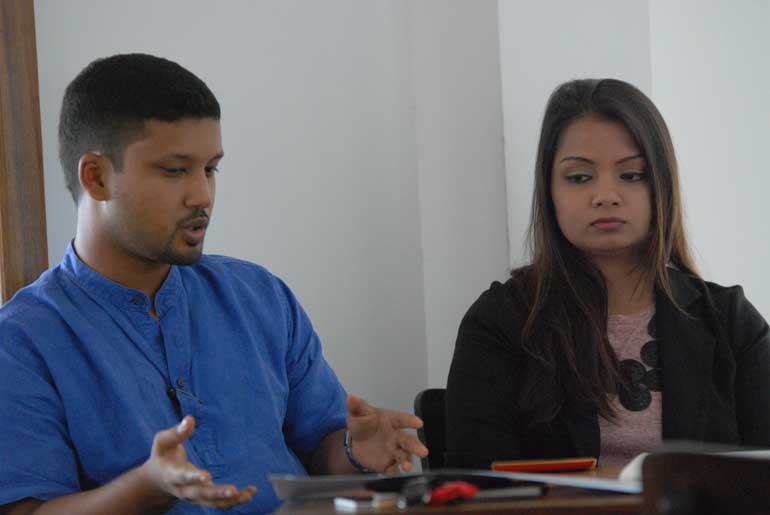
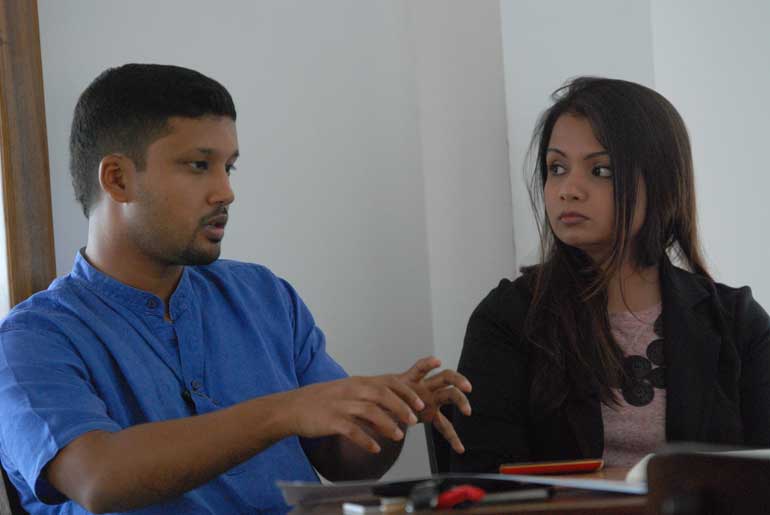
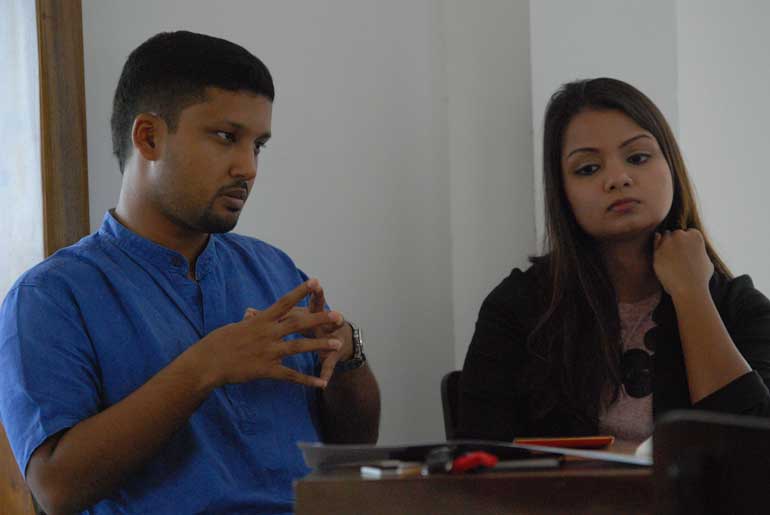
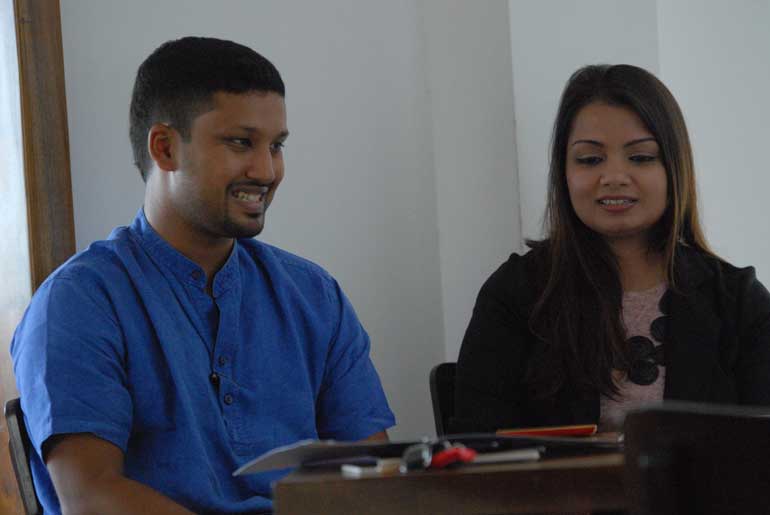
By Fathima Riznaz Hafi
Unlike physical illness, mental illness is rarely discussed openly; the reason being stigma and the result being the mentally ill suffering in silence. Seeking change, two psychologists have set out to organise a walk in a bid to raise mental health awareness in the country. They will be conducting workshops island-wide where they talk to people about mental health issues, how to identify them and where to seek help, assuring them that there is no need to suffer in silence and that help is available for free.
Nivendra Uduman and Hansini Gunasekara will be embarking on the journey on 18 August and estimate it to take around 40-45  days. In an interview with the Weekend FT the duo spoke of their plans.
days. In an interview with the Weekend FT the duo spoke of their plans.
Nivendra is a counselling psychologist. He obtained his Masters in Bangalore, India, after which he returned to Sri Lanka in 2014 and has been working for an organisation called ‘Samutthana’ which works with capacity building and mental health. He also runs a small private practice where he provides therapy. He does some teaching as well.
Hansini’s basic training is in research and psychology. She obtained her Masters in UK about two years ago and since she moved back to Sri Lanka she has been teaching quite a lot and doing some research with UK.
Inspiration
The idea for ‘Footsteps to Freedom’ came about when Nivendra was carrying out flood rescue work recently in Angoda and was working with an ex-major in the Army who had done a similar walk for the CCC Cancer Home two years ago.
“I was inspired by his idea and thought since mental health is not something that is spoken about so much and people don’t have so much awareness of it around the country, why not do something a little different and spread awareness though a walk – like what he did. When I talked to Hansini about it she was interested in joining as well. So that’s how it all started,” said Nivendra.
“We’re doing this mainly to raise awareness; to let people know that it’s okay to seek help, it’s not a bad thing or a sin to have a mental illness. We all have our different issues of life. We are doing this to let people know that there is support available and it’s okay to ask for help – not just for physical illness but also mental health problems. We want to combat the stigma that surrounds mental illness around the country and that is everywhere – even in Colombo – that’s another reason we are doing this,” he added.
“We will be carrying with us a lot of leaflets and brochures of other organisations that offer support helplines and suicide helplines so people would know there is support. This is free but there is also support in Government hospitals as well.”
Island-wide initiative
The walk begins in the south of Sri Lanka and ends in the North. This island-wide awareness initiative starts at Dondra, he explained, pointing at the location and referring to a map that he had brought along. This gave me a clearer idea of their coverage – it’s literally the whole country that they will be touching.
The walk is divided into six phases: the first phase would be Dondra to Ratnapura; second would be Ratnapura to Kandy; third Kandy to Dambulla; then Dambulla to Vavuniya; Vavuniya to Kilinochchi and finally Kilinochchi to Point Pedro. So it’s across the whole country, starting from the South and moving up to the North. They are estimating the walk to take around 40 to 45 days.
“We will be walking half the day and will stop at a place and deliver our workshops during the latter part of the day or we could deliver early the next day and then start walking. During the nights we will be sleeping at the town we arrive at but at each phase we will be taking a break and we can do workshops at that time; unless there’s an injury, one of us gets sick or something happens,” said Hansini.
The Army will help them with the accommodation after Kandy but before that some people have offered to have them at their houses. Other people will be joining them for the walk but they will be responsible for their own accommodation.
“We don’t have enough funding; otherwise we would love to help them with accommodation too,” Nivendra explained. “Our families are helping us with the finances; though we are both working what we earn is not enough to sustain this. Family and friends are the main support system here.”
Workshops
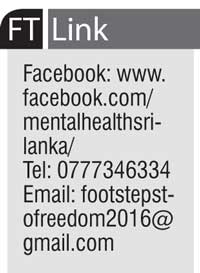 The workshops will be conducted by Nivendra and Hansini but they will also be joined by other psychologists at some stops as they will be doing the walking and will need the extra support from others. In the North there will be language barriers as neither Nivendra nor Hansini can speak Tamil. They will therefore have colleagues who speak Tamil come to the workshops with them.
The workshops will be conducted by Nivendra and Hansini but they will also be joined by other psychologists at some stops as they will be doing the walking and will need the extra support from others. In the North there will be language barriers as neither Nivendra nor Hansini can speak Tamil. They will therefore have colleagues who speak Tamil come to the workshops with them.
One of the topics that will be covered is ‘Introduction and identification of common mental health problems’; where they will be talking about depression, anxiety, schizophrenia, OCD and other mental health problems, giving people basic ideas while not going into too much technicalities. They will then know how to identify the problems, what the symptoms are, what the causes are and what kind of help is available.
Another segment would be on child sexual abuse prevention, domestic violence, suicide prevention, substance abuse-related problems, stress management and exam stress management.
There will also be a segment for the Army; relationship building skills with families and also substance and alcohol related issues are some of the areas that will be focussed on.
They will be having several topics for kids, adolescents, adults and the Army – doing it accordingly depending on who they are taking with.
“Workshops can be in schools, temples, clubs or community centres –wherever people gather. Sometimes we might not even plan ahead – we might just go to a temple or community centre and say we are here and we’d like to offer our services by talking to people. Some of it will be spontaneous. We’re hoping to get in touch with Rotaract as well and ask them if there are any Rotaract Clubs on the way and if we can do things with their members,” said Nivendra.
“We don’t have one particular target group because mental health is for everyone – not just one particular bunch of people. We believe that every citizen in Sri Lanka should be responsible for the well-being and mental health of himself and others around him. That’s a very important message I want to pass,” he stressed.
Flexibility
“We are flexiblein how we conduct the workshops – tailor making our services according to needs. We will be communicating in Sinhala until we reach the North, where our colleagues will be helping us with the Tamil language. We’ve gotten some Power Points  ready as well but in some places we acknowledge that there won’t be facilities to display Power Points; so if that’s the case we are also going to do it without that,” he said.
ready as well but in some places we acknowledge that there won’t be facilities to display Power Points; so if that’s the case we are also going to do it without that,” he said.
“In schools we would talk separately to teachers and students. We may also talk to both, depending on what the school wants.There is not one group that is exclusive. When I say ‘challenge the stigma’ and ‘challenge the discrimination’, it’s inclusive of all these groups – even elders – we are not going to leave out any groups,” he added.
Support gradually increasing
“Since we started the Facebook page, during the first few weeks the response was very slow but now it’s picking up because we also started another awareness campaign called ‘Shatter the Stigma’ where we have young people and all sorts of people holding slogans around anti-stigma when it comes to mental health. We are having that in parallel with organising the walk; so now the response is slowly getting better than what it was wherein people are helping with accommodation and have offered to organise our workshops for us and slowly things are falling into place,” he said.
“A lot of our friends, colleagues and family members are coming forward to support us in different capacities. Some of our colleagues will be joining us for the workshops that we will be doing at different stops as well and people will be joining us during the walk. The two of us will be walking the whole length but other groups will be joining us – some at different points – some maybe all the way. In terms of support we have a group of young volunteers – our students – helping us with the logistics and so on,” said Hansini.
“The Sri Lankan Army is supporting us hopefully with accommodation and we are also doing a lot of workshops for the army camps especially the Northern area; they’ll be helping us out especially with the logistics,” added Nivendra.
Till the walk starts we are going to try to get in touch with the Ministry of Health and Mental Health Directorate and ask them to help us get people together in different locations; and also Base Hospitals – there’s one in Mawanella in the South and they have agreed to have around 25 people for us to talk to. So that way we are going through the hospitals as well,” he said.
Shatter the Stigma
Through another campaign that they are running simultaneously, called ‘Shatter the Stigma’ they are getting people to hold up slogans. It is meaningful to them. They are also getting people to talk about their own experiences on mental health, on video, and are going to start a campaign surrounding that as well – as a kick-off for the walk.
“Lots of people do projects like this but not related to mental health. Topics surrounding mental health are not addressed in many segments in Sri Lanka – not in schools or anywhere; it’s a taboo topic and as a result there is stigma. So we want to try and start a conversation around it: It’s okay to talk about it; help is available. Hopefully that would be a very important starting point,” said Hansini.
Obstacles
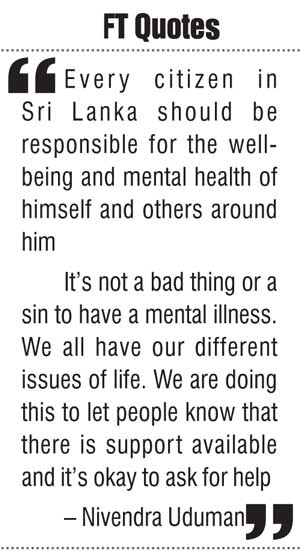 “We have identified certain stops where we would like to do workshops. A problem would be to identify a central point of contact. Obviously we have to go through some organisations whether it’s a school or hospital. One of the biggest obstacles is getting in touch and getting things organised,” Hansini said.
“We have identified certain stops where we would like to do workshops. A problem would be to identify a central point of contact. Obviously we have to go through some organisations whether it’s a school or hospital. One of the biggest obstacles is getting in touch and getting things organised,” Hansini said.
“We are going through a few groups, for example there are consumer action groups for mental health, along the Southern area so we are going through them to try to organise some workshops for the community. We don’t necessarily want to make it for only hospital staff or doctors; we want the general community to be involved and for them to get awareness. That’s the whole idea of the walk. It would be a mixed population – we don’t really have a limitation as to who can attend our workshops,” said Nivendra.
“So they are helping us in the southern areas and the Army will get people – their soldiers together in camps in different locations. Obstacles are very much present – mostly with the logistics and organising these things – it takes a lot of time for people to get back to us – because they are from different parts of the country. But other than that things are slowly beginning to fall into place.”
Preparation
The duo is busy doing their ‘training walks’ now. They are working out and getting ready – mentally and physically and say there is a lot of preparation that they need to do.
Right now they are also planning on doing some workshops in Colombo before they launch, to raise funds to sustain their walk. Hansini had facilitated one on ‘Art Therapy’ and funds they get from that, though not a lot will help them to get their gear together.
“Eventhough we are not walking through Colombo during the walk, people in Colombo can help participate in our workshops over the next couple of weeks. Almost every week we will have something,” said Hansini.
They are hoping to go to the Good Market at least once before they launch and are getting some wrist bands done so they could sell and raise some money.
How to help?
When asked how we could help them Nivendra said, “We have a fund collecting donations to provide mental health support to people who were affected by the recent disasters – landslides and floods; people can donate to that. They can also sponsor some of our equipment because that’s something we are struggling with – to set up our gear. They can join us and walk with us – it would give us a bit of support as well.”
“They can participate in the workshops or maybe help us out with accommodation. It’s not something that the two of us alone can do; if your readers can do their own bit to join us in that process of combating stigma and shame surrounding mental illness I think that’s a wonderful thing that they can do,” Hansini added.
With so many people silently suffering from mental illness around the country, this initiative to create awareness, ‘rescue’ them from their present condition and guide them to seek helpis a commendable one. The workshops that will help them identify their problems, advice them on what they can do and direct them to the right sources for help could ultimately empower them to move out of misery and on to the path of freedom.It is hoped that people will come forward to support this worthy cause in any way they can, be it in the form of money, accommodation, participating in the workshops or joining the walk.
Pix by Shehan Gunasekara